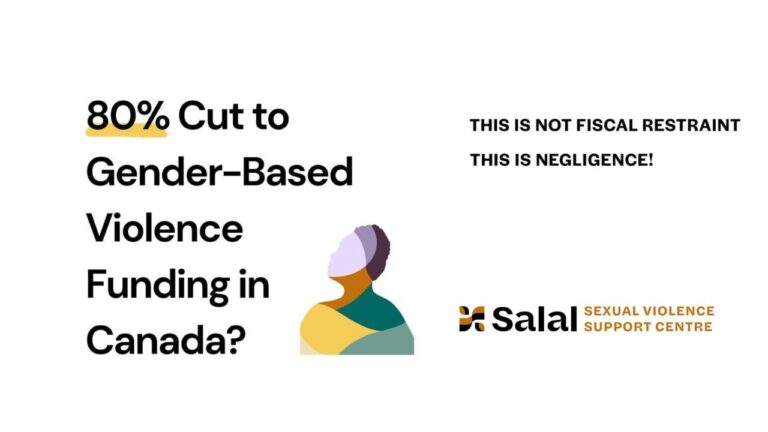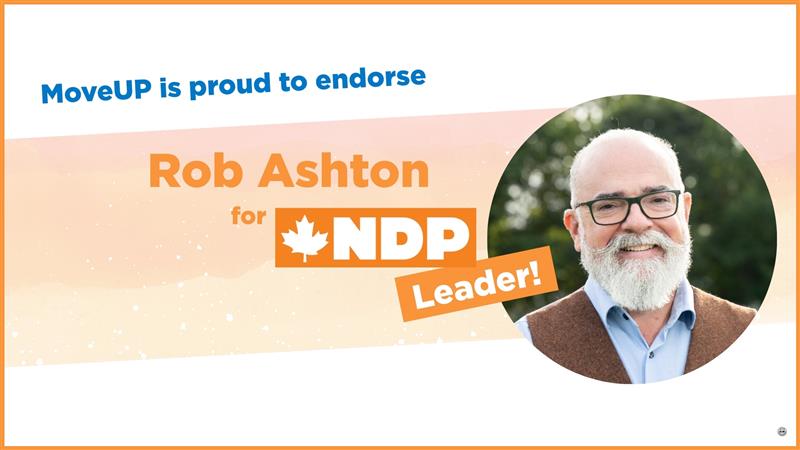By Dalya Israel, Executive Director, Salal Sexual Violence Support Centre
This week, Canadians learned that the federal government plans to cut 80% of the budget for Women and Gender Equality Canada (WAGE) over the next three years.
Let’s be clear: this isn’t fiscal restraint. It’s negligence dressed up as economic necessity. It’s a calculated political choice that will devastate survivors of gender-based violence and dismantle the community-based organizations that help keep them alive.
At Salal Sexual Violence Support Centre, these cuts hit at the heart of our work. Our 24-Hour Crisis and Information Line, funded in part through the National Action Plan to End Gender-Based Violence, administered by WAGE, is a lifeline. It allows us to answer calls at night and on weekends, when crises often escalate, and to offer trauma‑informed care in the moments after violence. WAGE also funds critical infrastructure and capacity building support for Salal and organizations like ours so that we are able to support the people who support survivors.
Without this funding, those phone lines will go quiet and the structures and systems that hold our people up will be stripped away. Survivors will be left with fewer options, or no options at all, in their most vulnerable moments and staff will lose critical support that allows their work to be sustainable.
A betrayal in the face of rising need
In recent months, we’ve seen a surge in crisis calls from across the country, including from small communities already short on resources. Some callers are reaching out after being retraumatized by disturbing testimony and footage related to the Sean “Diddy” Combs case or the decision in the court proceedings involving Hockey Canada. The stories dominating the headlines, stories of denial, gaslighting, and impunity, mirror the experiences of so many survivors.
Instead of increasing funding to match the rising need, the Federal Government is choosing to strip it away. And the timing could not be more disappointing. Just months ago, Dr. Kim Stanton released a provincial report in BC confirming what survivors have long known: community-based, survivor-centered organizations are best positioned to support survivors and lead gender-based violence work. We expect to see the same recommendations come out of the Federal Ombudsperson’s report later this summer.
To receive this validation then watch Ottawa gut funding anyway is more than a policy failure. It is a betrayal.
The human cost of these cuts
When we talk about “cuts,” it can sound abstract, like an accounting exercise. But here’s what it really means:
- Survivors turned away, put on waitlists, with no 24 hours response
- Reduced support for 2SLGBTQ+ and gender‑diverse communities
- Cuts to outreach, prevention, and public education
- Layoffs and closures at frontline organizations
It’s not just survivors who will pay the price. The workforce that powers these services, the people answering the calls, providing shelter, running prevention programs, will also be hit hard. And that workforce is not just any workforce.
The GBV workforce: survivors, marginalized genders, community lifelines
According to research by the Ending Sexual Violence Association of Canada, Canada’s gender-based violence (GBV) sector employs nearly 30,000 people across more than 1,400 organizations.
The majority of these workers are women and folks of other marginalized genders, and many are survivors themselves. Over two-thirds identify with at least one equity-seeking group, including 2SLGBTQIA+, Black, Indigenous, and other racialized identities.
They bring lived experience, cultural competence, and deep community ties to their work; making them uniquely qualified to offer the survivor‑centered, trauma‑informed care that is proven to save lives.
And yet, despite their skill and dedication, these workers are chronically undervalued and underpaid. Short‑term project funding leads to job insecurity. Wages lag far behind comparable public‑sector roles. Burnout is rampant, with more than half of GBV workers reporting emotional exhaustion.
These cuts will only make things worse. They will hollow out a skilled workforce that Canada cannot afford to lose.
An essential sector for Canada’s safety, security, and economy
This isn’t just about compassion; it’s about public safety. The GBV sector is as essential to Canada’s safety net as healthcare or policing. It responds to crises, supports survivors, prevents future harm, and builds healthier communities.
Undermining this sector is not only morally indefensible, it is economically short‑sighted. The cost of gender-based violence to Canada’s economy is estimated in the billions annually, through healthcare, policing, lost productivity, and long-term social impacts. Every dollar cut from prevention and support services will be paid back many times over in these costs.
We can stop this
These cuts are not inevitable. They can, and must not be, actioned.
Here’s what you can do:
- Call or email your Member of Parliament.
- Use our online form to contact federal leaders.
- Tell them gender-based violence is not a “side issue”, it is a national crisis.
Survivors deserve more than symbolic gestures. They deserve fully funded, community‑rooted support. And the people doing this life‑saving work deserve fair pay, stable jobs, and the respect of a government that claims to care about gender equality as well as safety and economic stability.
Salal will keep showing up for survivors. But we need you with us; because if these cuts go through, survivors and the people who serve them will be left fighting for their lives in silence.
Survivors Deserve Better!
Use our pre-populated form to contact Prime Minister Carney
Call or email your MP today
Support Survivor-Centered Services
More Information can be found here:
https://endingviolencecanada.org/gbv-worker-wellness/
https://www.criaw-icref.ca/statements/statement-on-wages-budget/



